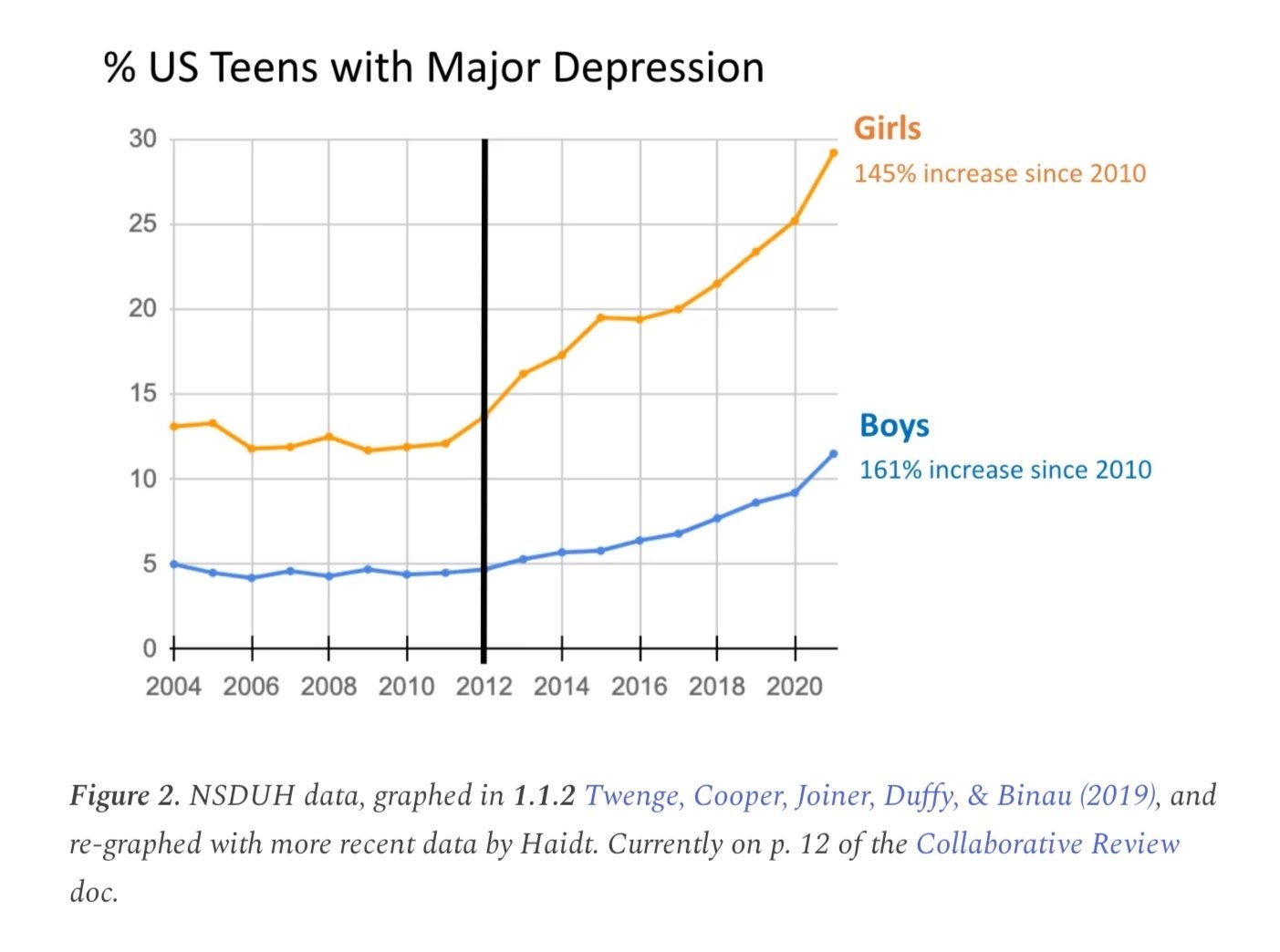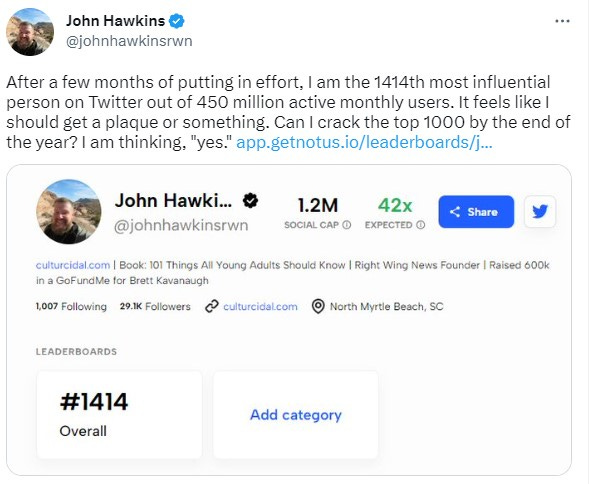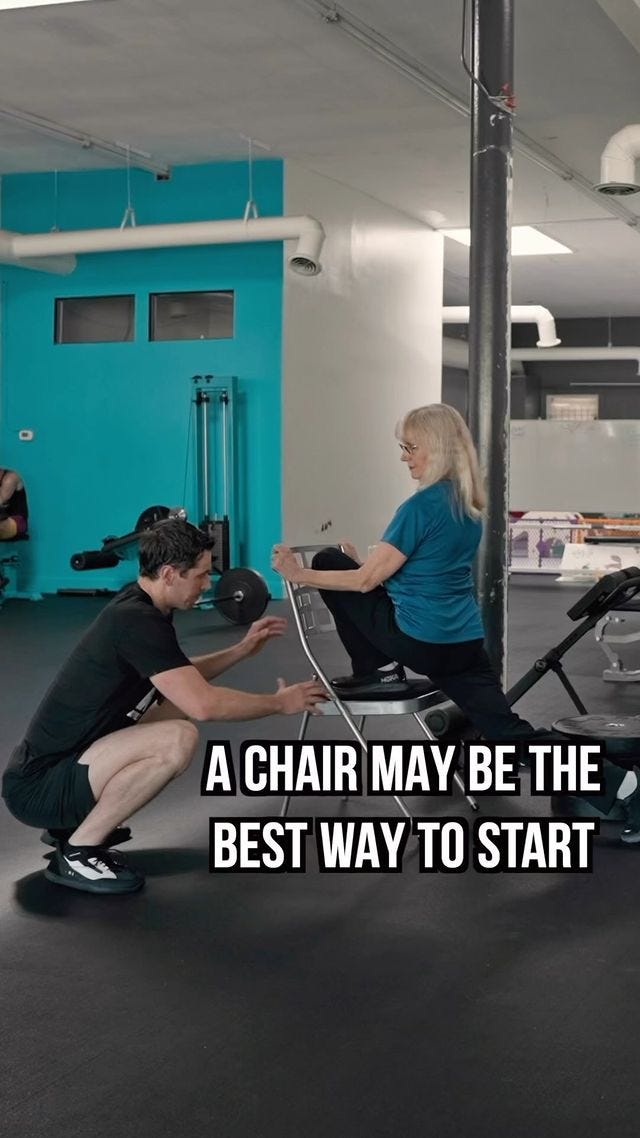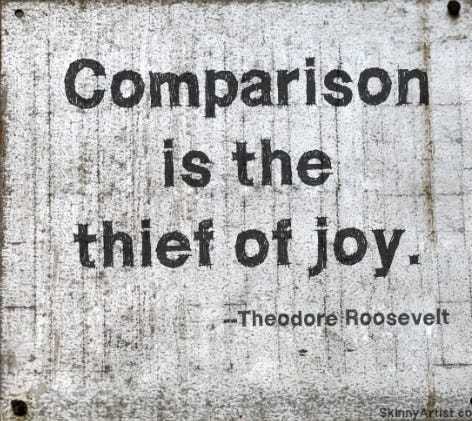7 Reasons Why Social Media Makes People Depressed, Anxious, and Unhappy
Social media is the worst invention since heroin
There is an abundant amount of evidence that social media makes people, particularly young people, depressed, anxious, lonely, and unhappy. Johnathan Haidt has written about this topic extensively and he notes that:
The great majority of studies find a positive correlation between time on social media and mental health problems, especially mood disorders (depression and anxiety). At present, there are 55 studies listed in our review that found a significant correlation, and 11 that found no relationship, or nearly no relationship.
Social media started to really take off around 2010 and that is also when you started to see its negative effects shoot up like a rocket among teens. Although teens may be suffering the most, the American population as a whole isn’t doing too well either.
Why does social media cause these problems? Well, we can’t say with absolute certainty, but as someone who was on the Internet before social media took off, built a conservative Facebook page with millions of followers, and who is currently putting up enormous numbers on Twitter despite a relatively small 29.5 thousand follower count, I can give you some very educated guesses as to what’s happening.
1) Toxic communication: Believe it or not, Internet forums, chat rooms, and websites didn’t use to be toxic. For example, the pre-social media comments section on my old Rightwingnews.com website had a fairly large, fairly normal group of people who were generally intelligent and pleasant to chat with. Yes, there were “trolls,” but they were relatively rare, and the general consensus was that they had issues and people should basically ignore them until they were banned. Today, if you post something on Twitter that gets a lot of attention, it wouldn’t be a surprise if you get hundreds of people liking a comment and calling you a c***. If you’ve been in the trenches long enough, you get to the point where you genuinely don’t care what people you don’t know have to say, but bathing in the gratuitous insults, nastiness, and toxicity that goes with social media can be extremely mentally draining if you haven’t become accustomed to it. It’s poison for your mind and if you don’t have the antidote, it can really make you sick.
2) Destroying faith in humanity: You may have heard someone say, “You really wouldn’t want to know what people think” and that’s probably true. Unfortunately, social media is all too often exactly that, and worse yet, the weirder, more anti-social, and more disgusting the thought is, the more likely it is to get attention. From there, you’ll find that defending the indefensible is pretty much some people’s full-time job on Twitter. No matter how evil, offensive, or disgusting it is, more than a few people will step up to say it’s really great. That goes double if the person saying it has a large following. It’s really hard to imagine the best about other human beings when you’re seeing them at their absolute worst on social media every day.
3) The never-ending race for attention: Social media is a never-ending race for positive attention/validation and most human beings are really not well-equipped to run it. Most people pretty quickly run out of witty things to say or cool things to show themselves doing and end up asking, “Now what?” The answer they come up with is all too often sarcasm, nasty comments, or, for women, showing off their bodies for attention. Then, people find themselves saying and doing things they don’t really feel comfortable with to impress people they don’t know while feeling pressure because they know they’ll have to do it all again tomorrow. It’s the mental equivalent of being stuck in a cage, running on a hamster wheel all day long, knowing you’re going to have to do it again the next day. When you think about it like that, it’s easy to see how it could make some people depressed.
4) It rewards bad behavior: Social media typically rewards cutting insults, spewing propaganda and acting like a prostitute, not being kind, original thinking, and demure behavior. A lot of the most popular people on social media are a little broken as human beings but in an entertaining way. Maybe they’re sociopathic enough to be masters of the low blow, are so emotional they fly off the handle constantly or are so histrionic that they’ll do anything to get attention. While it’s certainly not true that social media ONLY rewards bad behavior…
….the incentives are heavily slanted towards it in a direction that creates strife, not harmony, that promotes charm, not wisdom and that rewards targeting your tribe’s enemies, not bringing different sides together. If you take the behaviors you learned on social media back into the real world, it’s unlikely to lead to good outcomes for you.
5) It raises the bar too high: Teddy Roosevelt once said:
There is an awful lot of truth to that because despite what many of us think, we human beings tend to view ourselves through the lens of other homo sapiens. What we think of ourselves depends a great deal on what other human beings think of us and how we feel that we stack up to other people. In fact, that’s the basic description of how self-esteem works. You compare yourself to other people. You go, “Wow, I am pretty good/bad at that compared to other people,” and you feel better or worse about yourself as a result. In the pre-Internet days, you might have felt like you were incredibly strong because you had one of the best bench presses at your high school, pretty because you were the best-looking woman in your church, or successful because you owned the only grocery store in a small town. Now that the Internet and social media have shrunk the world, it’s very difficult to feel like a world beater when we’re all exposed to people that are orders of magnitude more successful than we are on a daily basis. Oh, you’re strong? How do you compare to the professional bodybuilder you follow on Instagram? Not so well, right? You’re hot? Compared to the Egyptian model who took 1,000 different photos last week and put up the best one after it was professionally photoshopped? Not really. Do you think you’re successful? Cool, well let me introduce you to Elon Musk’s tweets. He could do more of them, but he’s busy moving between all the billion-dollar companies he owns and runs. If you don’t have a good sense of the world and your place in it, social media can make you feel like a very inadequate human being.
6) It replaces healthier activities: Twenty years ago, the average person wasn’t on social media at all. Today, that same average person spends two and a half hours on social media each day. So, that begs the question – where does that time come from? Some of it is probably a lateral move from things like video games, TV, or reading gossip magazines, but it also undoubtedly takes time away from things like reading, studying, working out, socializing with your friends in person, and perhaps most importantly, sleeping. When I sleep, I keep my room cold, comfortable, and dark with no lights of any kind. To this day, I still remember having a woman sleep over and she took her phone into the room with us when we went to bed. Even though it was after midnight, it seemed like it made a noise every minute or two. After twenty minutes of that nonsense, I made her turn it off – but guess what? Most people don’t have someone making them turn the phone off. They spend all night getting notifications that disturb their sleep and you know what poor sleep causes? Things like anxiety and depression.
7) The media outrage machine: We’d have to go back to evolutionary psychology to explain why negative emotions like anger, outrage, and fear draw more eyeballs than positive emotions like gratitude, kindness, and enthusiasm, but even without having that discussion, we can definitively say that negative emotions grab your attention. That’s why media works non-stop to slant every story in a way that pisses you off, freaks you out, and makes you think the whole world is about to fall apart. However, the thing is, even if these are the emotions we human beings tend to be drawn towards, it’s not healthy for us to swim in them. If you spend all day long, every day listening to people trying to convince you that everything is horrible and that you should be terrified and furious, no one should be surprised if it works.










SM is addictive. No doubt about it. I think if somebody from the 1800s were to simply observe the behavior of the people in this nation…watching them walk/sit/lay around looking at “smart” phones, they would call our “smart phones” some kind of mind control device. They would probably be appalled, awestruck, and confused.
There is a psychology behind it. Seems human nature is integrated into gossip. Mentally, it transfers a persons attention away from everything they don't like about themselves. Entertainment/movies/video games, alcohol, drugs, social media, sports, news and politics - when these demand our focus we;re able to forget how lousy our job is, the terrible relationships and mistrist we have with spouses-kids-parents-neighbors-coworkers. Social media is one of many distractions people use to forget their discontentment and lack of peace, the feeling of lack of success, and maybe a deep down built-in guilt that *maybe* there is a God and we've fallen short.
And that there will be accountability after all.